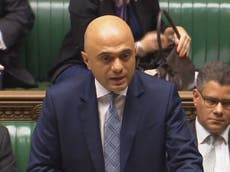Sajid Javid will make Theresa May's life easier – but not for long
Javid is considered a safe pair of hands, even if the definition of that term has been devalued in the chaos of recent times

In simpler times, the first black or minority ethnic person to hold one of the country’s four great offices of state would be a moment of history worth pausing to acknowledge. But life moves too fast these days, and the deserved elevation of Sajid Javid to the highest realm of politics immediately poses questions of huge importance.
Javid is considered a safe pair of hands, even if the definition of that term has been devalued in the chaos of recent times.
Only as recently as in the last few weeks, he described Momentum, the grassroots movement that consolidates Jeremy Corbyn’s grip on power in the Labour Party, as “neo-fascists”. These were incendiary words at the time, and will be considered even more so now.
It is testament to him that arguably the most disgraceful incident to have occurred in Britain in its modern history, the Grenfell Tower fire, occurred on his watch, and his reputation has survived, but that is not to say he handled the disaster either especially well or especially badly.
In the weeks after the fire occurred, it took the media to expose horrendous revelations about similar flammable cladding surrounding hundreds of tower blocks around the country. And the speed at which the tests on those towers occurred left much to be desired.
It is also, as something of an aside, a mirror to Britain’s curious political culture. Prior to politics, Javid was on the board at Deutsche Bank. His rise through the ranks at the City, from humble origins as the son of a bus conductor, is close to extraordinary. And yet, after his first jobs in government as a junior City minister, he has been shifted around cabinet roles in the wake of other scandals and crises at alarming speed.
He lasted only a year at business, before being reshuffled by Theresa May in 2016. In his time at the top, only briefly has he done the kind of job one would imagine he is best suited for. He now adds the Home Office to a CV that already lists a brief stint in charge of culture, media and sport, and communities and local government. It is, arguably, a pity that he is yet to have a proper run at something better suited to his talents.
Prior to Javid’s announcement as home secretary, it was widely pointed out that of the many challenges facing Theresa May, one would be to “preserve the Brexit balance” within cabinet.
Strictly speaking, having also re-admitted Remainer James Brokenshire to the cabinet as communities and local government secretary to replace Javid, the balance remains the same.
But Javid’s elevation is a radical alteration at the very top table. Javid voted remain – more out of loyalty to George Osborne than anything else, it was suggested at the time – but he has been widely considered a Brexiteer at heart, both before and since.
Barely a week ago, as the government was defeated in the House of Lords over leaving the customs union, Javid said the referendum had provided “clear instructions to politicians” to leave the customs union.
This could hardly stand in graver contrast to his predecessor as home secretary, an ardent Remainer, who took part in TV debates during the remain campaign, memorably describing Boris Johnson as “the life and soul of the party but not the man you want driving you home at the end of the night”. Quite what was meant by that remark has been much debated since. Few of the options are great.
Rudd is now widely expected to join the committed band of pro-EU Tory rebels, like Dominic Grieve, Nicky Morgan, Justine Greening and Anna Soubry, affectionately known as the “mutineers”. Her potential to damage the government is large, but will arguably be offset by the presence in her old job of a man fully signed up to Theresa May’s position on leaving the single market and the customs union, as set out in her various speeches at Lancaster House and Florence. It is a position that, of course, remains unchanged despite the British public flatly rejecting it at the election, and there being no parliamentary majority in support of it.
Javid’s position is common among Brexiteers, but it is indisputably wrong. As much as he may wish it to be true, the referendum did not provide clear instructions to politicians to withdraw Britain from the customs union. The referendum, and its decisive yet narrow margin of victory, provided no clear instructions whatsoever as to the manner of the UK’s departure from the bloc, of which a vast and complex range of options are possible.
It is clear that Javid shares Theresa May, Boris Johnson, Liam Fox and David Davis’s view that the UK’s future is outside the EU’s customs union, or indeed any system replicating a customs union that can be invented to replace it. A consenting voice replacing a dissenting one at cabinet may make Theresa May’s day-to-day life easier, but it will not alter the fundamental question rising up on the horizon to meet her, and which is currently taking no other shape beyond a full parliamentary crisis. That her position is not supported by parliament, and may very well not be approved by it.
To that grave question, Javid is not the answer. But then again, no one is.






Join our commenting forum
Join thought-provoking conversations, follow other Independent readers and see their replies
Comments